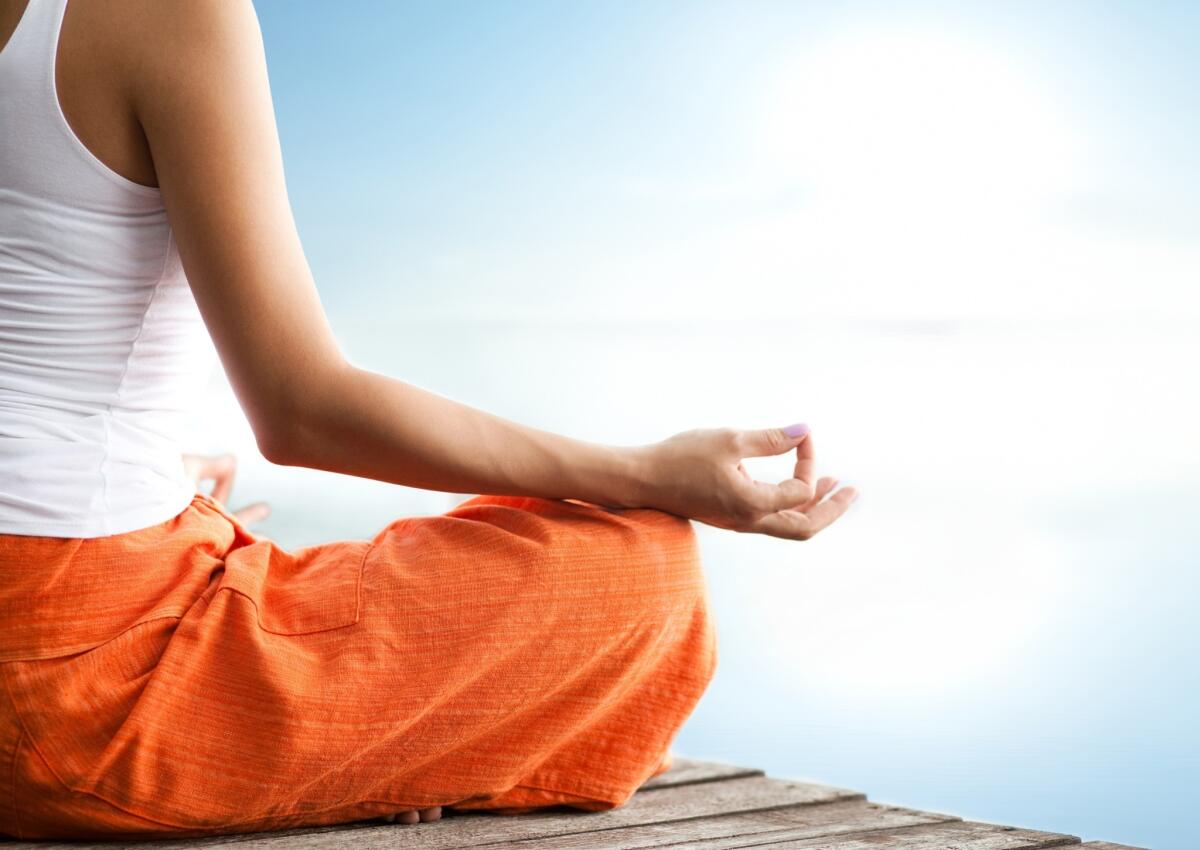Meditation and mindfulness tips for coping with the coronavirus pandemic

Paying attention to whatâs happening in the moment is difficult in the age of COVID-19, but it can also help us cope during an unsettling time.
Are you worried about tomorrow? Just try to focus on today, says Diana Winston, director of mindfulness education at the UCLA Mindful Awareness Research Center. âMost of the time, our minds are locked in the past and future,â Winston explains. âMindfulness puts you in the moment. Most people are OK in the here and now. If you can put yourself in the present, you can handle difficult thinking.â
As people become more anxious as they self-quarantine at home, Winston recommends mindfulness meditation, a practice that has been proven to alleviate stress, depression and insomnia, as a way to cope.
People often feel discouraged when they first give meditation a try, Winston says, because their mind goes in a million directions.
Thatâs exactly what is supposed to happen.
Keep trying.
âThatâs part of the process,â Winston says. âEspecially now when there is so much to worry about. Youâre not doing anything wrong. Come back to the present moment. Or try to meditate for five minutes. Your practice will only get stronger over time.â
Try to avoid what Winston calls âworst-case scenarioâ forward thinking and focus on whatâs happening now. Using a train metaphor, Winston illustrates the ways in which our thinking can help us: âThe moment that we realize that weâve been lost in worry, it is possible to get off the train. If you realize that you are on the train, itâs important to know that you can get off. As you practice mindfulness, you donât even have to get on the train in the first place. You can stay on the platform and let those scary thoughts go.â
Whether you get on the worry train or not, Winston recommends using the STOP acronym, a well known mindfulness tool, to help calm yourself:
S: Stop. When you notice that you are feeling anxious and you need a moment: stop.
T: Take a breath. If you find yourself worrying about the future, bring yourself back to the present. Take a breath, pause, feel your feet on the ground.
O: Observe what is happening inside yourself. Does your stomach hurt? Is your heart racing? Ask yourself, âHow am I right now?â Bring yourself back to the moment.
P: Proceed with more awareness of yourself and what will help you. Connecting with a friend, or having some daily quiet time outdoors, can help.
When under duress, we can get overwhelmed and regress. The key to staying grounded during difficult times, Winston says, is to be kind to ourselves. âDonât be hard on yourself for eating lots of chocolate or âfeeling needyâ and calling your friends,â she says. âWith so much unknown, itâs scary. Weâre not going to be at our best.â
Nigel Sampson, owner of Whole Body Method Pilates and Certification Studio in Los Angeles, agrees. âEveryone needs to practice a little more kindness, awareness and compassion,â says Sampson who also works as a healer. âWe have to be as present as possible to navigate this moment in time. Itâs like a new world. In a way, we get to be better peopleâ
Sampson offers these simple meditation techniques as a way to stay healthy right now:
Breathe
Take a moment every day to do some slow, deep breathing. âWe tend to breathe a lot more shallow when we become fearful,â Sampson says. âWe have to use all the tools that we took for granted because we were so busy running our lives. We have to breathe deeper; more slowly and reset the nervous system.â
Nature
Being in nature is one of the most grounding elements that we have. âNature has its own intelligence and its own rhythm,â Sampson says. âYou can sense that the Earth is still supporting you. Go out and spend moments in nature. Brush your hands down a tree. Listen to the birds. Put your hands in water. Make nature a part of you.â
Movement
Movement is grounding because âYour body is a like an antenna,â Sampson says. âWhen it doesnât go anywhere, the body shuts down. That results in depression, sadness, isolation. Itâs important to shake the body up. â
Shaking
Stand up and shake your arms, legs and feet for a minute or two. You will feel a little bit calmer, lighter and happier. You may even smile and giggle. Sampson suggests doing this in the morning and before you go to bed. âIt will release all the energy that has been stagnant all day and you can let it go and start fresh. Itâs like taking an internal shower. You wouldnât go a week without a shower. So donât go a week without shaking. â
Visualization
You can create anything in your mind. Imagine yourself walking in a forest. âOften when you feel fearful, your sensations shut down,â Sampson says. âOpen yourself up to sensations by the practice of conscious visualization, which is just seeing something pleasant.â Imagine the sounds of nature, the feel of running water, the smell of lemon verbena. All of these sensations will bring you back to a better state.â
Although Sampson is a believer in the benefits of mindfulness meditation, he acknowledges these techniques wonât solve the grave financial hardships many are experiencing due to the coronavirus. But they can help put your mind in a better state to tackle the worries that come with the fast-moving pandemic.
âMeditation can put you in a state where it can help you make better decisions,â he says. âIt might help you feel a little less hopeless. In the end, itâs all about the state you are in and how that state can empower you. Once you do these techniques, you might have some empowering ideas and a sense of possibility.â
Online resources that offer help with anxiety
Ten Percent Happier
In an effort to help alleviate anxiety, stress and fear, this popular meditation app is offering a free coronavirus sanity guide online. Every day at noon, host Dan Harris, who famously had a panic attack while reading the news on âGood Morning America,â offers a âlive sanity breakâ with leading meditation teachers from around the country. The guided meditations are all posted on YouTube so you can watch them anytime youâre feeling anxious: tenpercent.com
Headspace
If youâve been wanting to try meditation but havenât had the time, this subscription-based app offers a free 10-day introduction course that guides you through the basics of meditation and mindfulness. $12.99 per month or $69.99 for a year, which includes access to a full library of courses spanning mindful eating to parenting, as well as a daily meditation, sleep sounds and bedtime exercises. headspace.com
InsightLA
The Los Angeles mindfulness training group offers a variety of classes, including guided meditations, on Zoom. A donation of $5 to $30 is suggested, but no one will be turned away for lack of funds. insightla.org
Calm
The mindfulness and meditation app is offering a page of resources with free mindfulness tools to offer support during the coronavirus pandemic. Content includes breathing exercises and journaling prompts to help you stay grounded. Like Headspace, the Calm app provides a basic course in meditation for free, with more advanced meditations requiring a subscription starting at $14.99 per month. A seven-day free trial is currently available. calm.com
UCLA Mindful App
Studio-recorded guided meditations and free weekly podcasts led by Diana Winston, a former Buddhist nun and one of the nationâs best known teachers of mindfulness meditation. Six week online classes are also available. Guided meditations are offered in English and Spanish. uclahealth.org
Whole Body Method
The Los Angeles studio is offering free Instagram live classes on @wholebodymethod as well as Zoom in-home private classes. wholebodymethod.com
Insight Timer
Insight Timer features more than 30,000 free guided meditations on more than 200 topics, including sleep, anxiety, stress and kids (there are upgrades that require a purchase). A yearly subscription is $60, with a 30-day free trial available. insighttimer.com
More to Read
Sign up for The Wild
Weâll help you find the best places to hike, bike and run, as well as the perfect silent spots for meditation and yoga.
You may occasionally receive promotional content from the Los Angeles Times.











